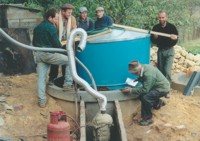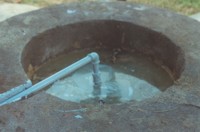|
The
Biological Gas Digester - an environmentally safe product, a permanent
energy supply, free gas, the best fertilizer, and the shortest way to
reduce rural poverty. Renewable energy is an interesting path toward
the solution of the energy crisis in Georgia. Energy generated from
biomass offers a variety of opportunities in agriculture, and solves a
lot of other problems as well. The bio-energy potential of Georgia
totals more than 600 megawatts; moreover, bio-energy is an
environmentally sound product.   The environment around the bio-digester is so clean that scientists involved in the project could hardly take samples of biomass for testing.  Bio-gas technology was not popular in Georgia, but some bio-gas digesters with environmental purposes were constructed in Soviet times, for example, the large digester built on the river Mtkvari for cleaning water from fecal waste. Independence aggravated Georgia's energy crisis in rural areas, and the local population was forced to search for alternative methods of solving the problem. The first handmade bio-digesters appeared about 10-15 years ago, but they operated only 4-5 months a year and could not work in winter, when they were most needed, so the population developed a skeptical attitude towards them. The most important condition for operating bio-digesters in winter is maintaining the warmth in them.    The latest stage of bio-gas technologies in Georgia started in 1994-1996: Mr. Avtandil Bitsadze, an engineer, an expert at the TACIS Energy Efficiency Center, a leading specialist and a founder of the non-governmental organization Bioenergy, received information from GATE GTZ about bio-gas technologies used in various countries around the world. On the basis of these materials and information from the National Hydro-meteorological Service, the Ministry of Agriculture and Food, and the State Department of Land Management, Mr. Bitsadze developed an effective design of a bio-digester, suitable for Georgian environmental conditions, able to operate even in winter, when the temperature of the soil is 20C - 150C. Bio-digesters built by Bioenergy are equipped with suntraps and effective thermo-insulating materials. This design was tested in the villages of Alisubani and Akhali Terjola, where four bio-digesters were constructed within the framework of the Word Bank ARET project. Two of them are of a Chinese design, operating without suntraps. Bio-digesters are easily operated. The farmer has to wash all waste from the cattle house to the digester twice a day, using warm water heated in suntraps. Extra warm water can be used for household purposes. Once established, a bio-digester can operate for 30-40 years. It is possible to construct bio-digesters using local building materials. Mr. Shonia, for example, does not have a big animal husbandry component to his farm, with only 3-5 cows, but it is enough to make the bio-digester operate, and to have the gas operate in the kitchen all day long. Fertilizer received in bio-digesters as a result of waste processing is rich in nutrients (ammonia, phosphorus, and potassium). It is an excellent soil conditioner, which means Mr. Shonias roses are blossoming as never before. Mr. Shonia hopes that when he returns to Abkhazia, he will use this knowledge and experience and construct the first bio-digester in Abkhazia. Mr. Bitsadze has published two manuals for farmers on how to construct a bio-digester without external help. Moreover, Bioenergy prepared a national program to introduce bio-digesters in Georgia. The program includes the development of training courses and the construction of model bio-digesters in all 56 regions of Georgia. Bio-digesters protect the environment from pollution In accordance with various international agreements, Georgia is committed to prevent the pollution of the Black Sea and to contribute to solving the problem of the global climate change. The agricultural sector is considered to be the most significant source of pollution in this problem, and requires special attention. The main sources of pollution in agriculture are unprocessed cattle waste and unwise use of mineral fertilizers, toxic chemicals and pesticides, the erosion of cultivated soils, and the high rate of destruction of forests around villages. Due to the aforementioned factors, underground and surface waters are being polluted, and the environmental characteristics of the rivers, coastal zone of the Black Sea, air and agriculture products do not correspond to internationally accepted standards. The Global Environmental Facility (GEF) made a decision to support the process of the introduction of bio-digesters in Western Georgia in the framework of its program. Benefits Energy saving: - Free gas for cooking; - Lighting houses with gas-bulbs. Economic: - Consumption of firewood significantly decreases, and therefore forests are protected and the money formerly needed for firewood is saved. - Substances processed by bio-digesters serve as organic fertilizer, and do not contain the toxic components found in factory-made fertilizers. This fertilizer ensures the growth of harvests by 10-15%, and farmers do not have to buy expensive fertilizers. - Fertilizer produced is an environmentally sound product and can be considered a step forward toward the globally important development of biotechnology and organic farming. - Farmers study how to construct bio-digesters and it becomes an additional source of income for them. Social: - As bio-digesters make farming more profitable, it will stem the migration flow from rural to urban areas, especially from mountainous regions. Now Bioenergy is implementing a project constructing 12 bio-digesters in two regions of Western Georgia with the help of the World Bank ARET program. Bio-gas is already generating from all 12 digesters, and only some installation works remain to be done. The project will be completed by the end of the current year. In October 2002, Bioenergy signed a contract with UMCOR to construct a bio-digester with a capacity of 40m3 in the Sachkhere region. Preliminary work has already started. According to Mr. Bitsadze, the economy of Georgia will benefit from the introduction and popularization of bio-digesters. Using the potential of biomass is one way to reduce rural poverty. At present bio-digesters are manufactured by the enterprise "Bioenergy". 5, Stanislavski str., 380019, Tbilisi, Georgia Phone: + 995 32 34 43 59 +995 77 45 35 78 +995 77 46 52 71 +995 77 43 39 97 |